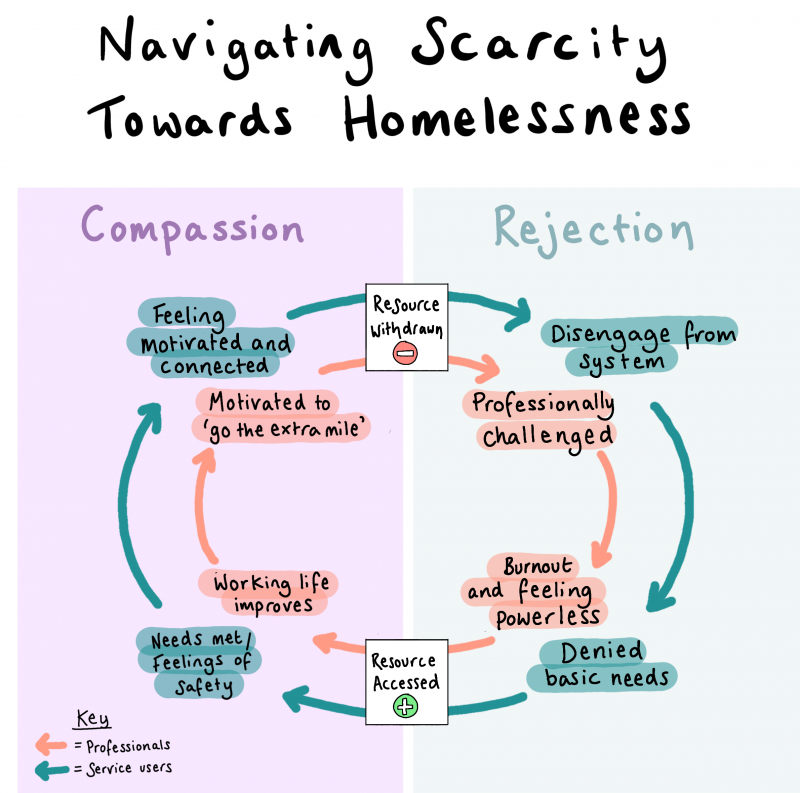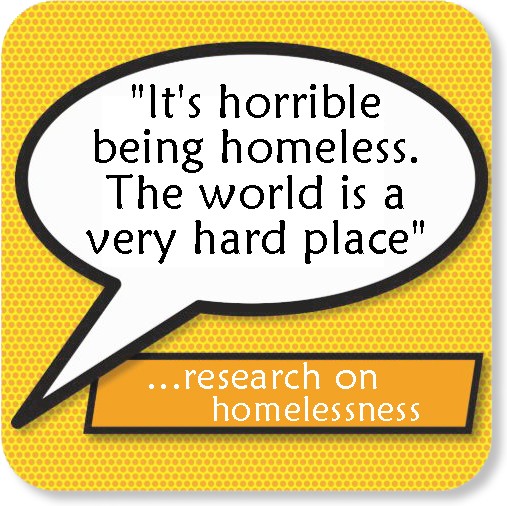
Established 2005 Registered Charity No. 1110656
Scottish Charity Register No. SC043760
DONATE
RECENT TWEETS
How can services be more
accessible to homeless people
labelled ‘hard to reach’?
Clinical psychologist Dr Ben
Campbell asked
Anyone with experience working in outreach or crisis services may be familiar with the description of 'hard to reach': a label used to describe people who need support, but, for one reason or another, aren't getting the help they need. However, what if we flipped that and asked: “What makes these services hard to reach for the people that need them?”
That question formed the basis of research I started in 2019 through the University of Liverpool. It put the voices of homeless people at the forefront of real-world conversations on getting access to support.
Nowhere was it more vital to highlight current issues in homeless care provision than in the cases of rough sleepers; those most vulnerable to physical and psychological injury as a result of their circumstances. ‘Good enough’ care, a term coined by psychoanalyst Donald Winnicott to describe care that need not be perfect but must meet core needs of stability and safety, was the yardstick in relation to how people (both service users and providers) interacted with the structures built to offer such care and I found frustrations on both sides of the conversation.

Participants spoke about the many hurdles to getting help. Rules often felt exclusionary and frustrating. The result? For those most vulnerable and those who are experiencing the dual difficulties of homelessness and addiction, mainstream services such as community mental health teams are often beyond their reach.
Accounts of dehumanisation and frustration was nowhere more apparent than in the story of Kate.
She told me about repeated assaults and abuse from the public, from the police, and when she did get support from statutory services, she was sectioned and driven far away from home only to be discharged back to the streets again with no support network or safety net.
“They sectioned me... [put me] in a hospital transport with blacked-out windows, they took me there, and I didn't know where I was. My mind wasn't functioning. Didn't have any form of contact with anyone, didn't know where I was. I was on my own, they wouldn’t tell me where I was, they wouldn't pull over so I could have a smoke. It was scary. It's like being passed from pillar to post. I felt really bad. I wanted to finish my life."
For Kate, the ‘cracks’ or gaps in services seem obvious. For others, it was frustrating asking for help, and for those that did, they were often told they didn’t meet criteria. In the case of many hostels, rules were enforced strictly, and this meant not always being able to get somewhere to stay overnight. Kelly spoke about her experiences in a particular hostel:
“I don’t think [hostels] look at the vulnerabilities of the person, at [this hostel] if you’re not back by a certain time they won’t let you back in, which is ridiculous. You’ve got lots of women prostituting themselves, escorting. There’s men there smoking spliffs, and the staff don’t say anything. And I just think, what? When did this happen? it's a roof over your head but it's not good for people, not for vulnerable people.”
It was clear also that ‘gaps’ and ‘hoops’ were present for the professionals attempting to provide care as best as they could within a framework that is ultimately too resource-scarce to make a longlasting impact and create change.
It is my hope that this research
can contribute to meaningful
progress, both in real-world care
systems and in further study of such
issues as they exist today.
Moving forward
Here are some of Ben's recommendations for people developing support services for homeless people:
- Systemic improvements, such
as sharing basic information,
improving referral pathways
and supporting agencies to
cooperate with one another,
would improve the practical dayto-day running of many agencies
and community organisations.
- Accessing support for difficulties with drugs and alcohol was incredibly difficult for the participants in this research. Reducing barriers to this type of support and exploring novel approaches to substance use may be of benefit.
February – March 2026 : Progress
CONTENTS
BACK ISSUES
- Issue 160 : February – March 2026 : Progress
- Issue 159 : December 2025 – January 2026 : Resolutions
- Issue 158 : October – November 2025 : Making a difference
- Issue 157 : August – September 2025 : Caring about care
- Issue 156 : June – July 2025 : Resilience
- Issue 155 : April – May 2025 : Second Chances
- Issue 154 : February – March 2025 : Time
- Issue 153 : December 2024 – January 2025 : Solidarity
- Issue 152 : October – November 2024 : Change
- Issue 151 : August – September 2024 : Being Heard
- Issue 150 : June – July 2024 : Reflections
- Issue 149 : April – May 2024 : Compassion
- Issue 148 : February – March 2024 : The little things
- Issue 147 : December 2023 – January 2024 : Next steps
- Issue 146 : October 2023 – November 2023 : Kind acts
- Issue 145 : August 2023 – September 2023 : Mental health
- Issue 144 : June 2023 – July 2023 : Community
- Issue 143 : April 2023 - May 2023 : Hope springs
- Issue 142 : February 2023 - March 2023 : New Beginnings
- Issue 141 : December 2022 - January 2023 : Winter Homeless
- Issue 140 : October - November 2022 : Resolve
- Issue 139 : August - September 2022 : Creativity
- Issue 138 : June - July 2022 : Practical advice
- Issue 137 : April - May 2022 : Connection
- Issue 136 : February - March 2022 : RESPECT
- Issue 135 : Dec 2021 - Jan 2022 : OPPORTUNITY
- Issue 134 : September-October 2021 : Losses and gains
- Issue 133 : July-August 2021 : Know Your Rights
- Issue 132 : May-June 2021 : Access to Healthcare
- Issue 131 : Mar-Apr 2021 : SOLUTIONS
- Issue 130 : Jan-Feb 2021 : CHANGE
- Issue 129 : Nov-Dec 2020 : UNBELIEVABLE
- Issue 128 : Sep-Oct 2020 : COPING
- Issue 127 : Jul-Aug 2020 : HOPE
- Issue 126 : Health & Wellbeing in a Crisis
- Issue 125 : Mar-Apr 2020 : MOVING ON
- Issue 124 : Jan-Feb 2020 : STREET FOOD
- Issue 123 : Nov-Dec 2019 : HOSTELS
- Issue 122 : Sep 2019 : DEATH ON THE STREETS
- Issue 121 : July-Aug 2019 : INVISIBLE YOUTH
- Issue 120 : May-June 2019 : RECOVERY
- Issue 119 : Mar-Apr 2019 : WELLBEING
- Issue 118 : Jan-Feb 2019 : WORKING HOMELESS
- Issue 117 : Nov-Dec 2018 : HER STORY
- Issue 116 : Sept-Oct 2018 : TOILET TALK
- Issue 115 : July-Aug 2018 : HIDDEN HOMELESS
- Issue 114 : May-Jun 2018 : REBUILD YOUR LIFE
- Issue 113 : Mar–Apr 2018 : REMEMBRANCE
- Issue 112 : Jan-Feb 2018
- Issue 111 : Nov-Dec 2017
- Issue 110 : Sept-Oct 2017
- Issue 109 : July-Aug 2017
- Issue 108 : Apr-May 2017
- Issue 107 : Feb-Mar 2017
- Issue 106 : Dec 2016 - Jan 2017
- Issue 105 : Oct-Nov 2016
- Issue 104 : Aug-Sept 2016
- Issue 103 : May-June 2016
- Issue 102 : Mar-Apr 2016
- Issue 101 : Jan-Feb 2016
- Issue 100 : Nov-Dec 2015
- Issue 99 : Sept-Oct 2015
- Issue 98 : July-Aug 2015
- Issue 97 : May-Jun 2015
- Issue 96 : April 2015 [Mini Issue]
- Issue 95 : March 2015
- Issue 94 : February 2015
- Issue 93 : December 2014
- Issue 92 : November 2014
- Issue 91 : October 2014
- Issue 90 : September 2014
- Issue 89 : July 2014
- Issue 88 : June 2014
- Issue 87 : May 2014
- Issue 86 : April 2014
- Issue 85 : March 2014
- Issue 84 : February 2014
- Issue 83 : December 2013
- Issue 82 : November 2013
- Issue 81 : October 2013
- Issue 80 : September 2013
- Issue 79 : June 2013
- Issue 78 : 78
- Issue 77 : 77
- Issue 76 : 76
- Issue 75 : 75
- Issue 74 : 74
- Issue 73 : 73
- Issue 72 : 72
- Issue 71 : 71
- Issue 70 : 70
- Issue 69 : 69
- Issue 68 : 68
- Issue 67 : 67
- Issue 66 : 66
- Issue 65 : 65
- Issue 64 : 64
- Issue 63 : 63
- Issue 62 : 62
- Issue 61 : 61
- Issue 60 : 60
- Issue 59 : 59
- Issue 58 : 58
- Issue 57 : 57
- Issue 56 : 56
- Issue 56 : 56
- Issue 55 : 55
- Issue 54 : 54
- Issue 53 : 53
- Issue 52 : 52
- Issue 51 : 51
- Issue 50 : 50
- Issue 49 : 49
- Issue 48 : 48
- Issue 47 : 47
- Issue 46 : 46
- Issue 45 : 45
- Issue 44 : 44
- Issue 43 : 43
- Issue 42 : 42
- Issue 5 : 05
- Issue 4 : 04
- Issue 2 : 02
- Issue 1 : 01
- Issue 41 : 41
- Issue 40 : 40
- Issue 39 : 39
- Issue 38 : 38
- Issue 37 : 37
- Issue 36 : 36
- Issue 35 : 35
- Issue 34 : 34
- Issue 33 : 33
- Issue 10 : 10
- Issue 9 : 09
- Issue 6 : 06
- Issue 3 : 03
- Issue 32 : 32
- Issue 31 : 31
- Issue 30 : 30
- Issue 29 : 29
- Issue 11 : 11
- Issue 12 : 12
- Issue 13 : 13
- Issue 14 : 14
- Issue 15 : 15
- Issue 16 : 16
- Issue 17 : 17
- Issue 18 : 18
- Issue 19 : 19
- Issue 20 : 20
- Issue 21 : 21
- Issue 22 : 22
- Issue 23 : 23
- Issue 24 : 24
- Issue 25 : 25
- Issue 8 : 08
- Issue 7 : 07
- Issue 26 : 26
- Issue 27 : 27
- Issue 28 : 28
- Issue 1 : 01

